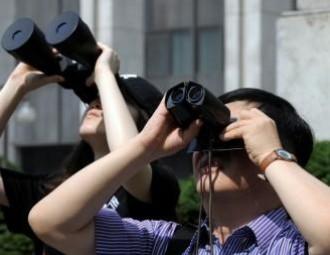Uladzimir Matskevich: The CIS Observation Mission for the parliamentary elections cannot be trusted
 Observers
Observers
In the work of the CIS Observation Mission, agreements on default between the authoritarian regimes are likely to prevail.
In the talk with a reporter of the EuroBelarus Information Service, the head of the Board of the International Consortium EuroBelarus, philosopher and methodologist Uladzimir Matskevich noted that “in any of the CIS countries no strong independent structure appeared which would provide the freedom of elections and implementing elections observation”. “In the Central Asian countries everything has returned not simply to the soviet, but to slightly “sovietized”, altogether archaic forms of social and state system of clan and tribal type”.
Herewith, he underlined said that “partially democratic institutions have started emerging in Ukraine, Moldova and Transcaucasia”. “But in these countries, as well, exists as a rule the division into the civil society institutions and the so-called GONGOs – structures imitating civil society and being controlled by the state or by certain oligarchs. Oligarchic forms of control over such quasi-NGOs are characteristic to Ukraine, as for the other countries (e.g., Azerbaijan, Armenia), state control is more typical. Exactly this situation takes place currently in Belarus”, said the methodologist.
“When delegations and groups for elections observation are being formed under the auspices of the CIS, these, as a rule, include representatives of state-controlled NGOs or political structures holding office. That is why such observer groups come to the site politically committed, with an assigned task, and they do implement their task during the elections – slant the facts observed in favour of the result given beforehand”, emphasized Uladzimir Matskevich.
The philosopher noted that sometimes it becomes possible to get a group of independent observers at the elections at the CIS territory. “They are few and represent either opposition political parties or are trained by some human rights structures. As a rule, they are not officially recognized by Central Election Committees of these countries. They rather work unofficially under the auspices of the opposition parties present in these countries”, said the expert.
According to Uladzimir Matskevich, as for the work of the Mission in Belarus, , “the experience shows that starting from the 1995 (de facto the second parliamentary elections in the country) until today the CIS observers haven’t noticed either the violations of the Electoral Code, or the violations of law, or any other falsifications”.
“They have always recognized elections according to the official figures of the Belarusan authorities and have always approved of what was happening, regardless of the violations recorded by the OBSE, domestic observers from the opposition parties and by independent observers”, notes the Head of the Board of “EuroBelarus".
The interlocutor highlighted that moreover, “the CIS observers have approved the elections regardless of the confessions of the officials; when, for example, before the previous presidential elections Lukashenko said that the previous elections had been rigged at his personal order, in order to reduce the number of votes “for”, avoiding by this unnecessary suspicion”.
That is why Uladzimir Matskevich assumes that “there can be no trust in the observation results from this part of observers”.
What concerns Russia’s ability to influence the work of the Mission, being the major player on the political scene of the region, the expert noted that “there is no doubt that Russian influence on any structures formed under the auspices of the CIS is very strong”. But in case of the CIS Observation Mission, according to Uladzimir Matskevich, “agreements on default between the authoritarian regimes are likely to prevail”.
-
03.01
-
07.10
-
22.09
-
17.08
-
12.08
-
30.09








































